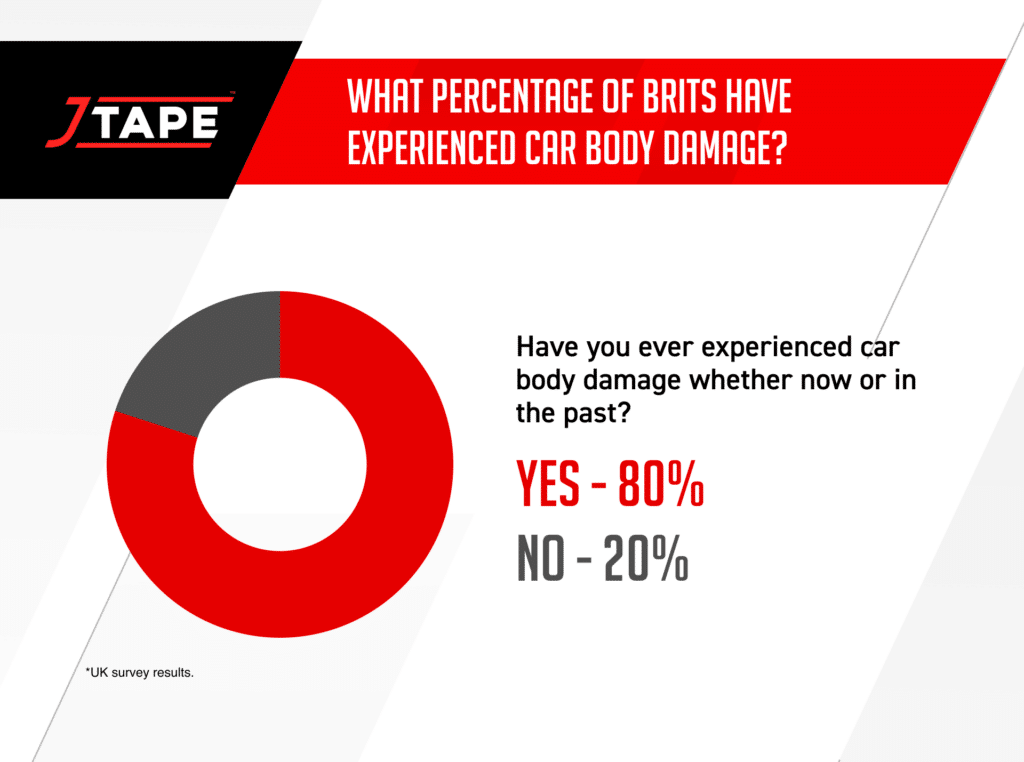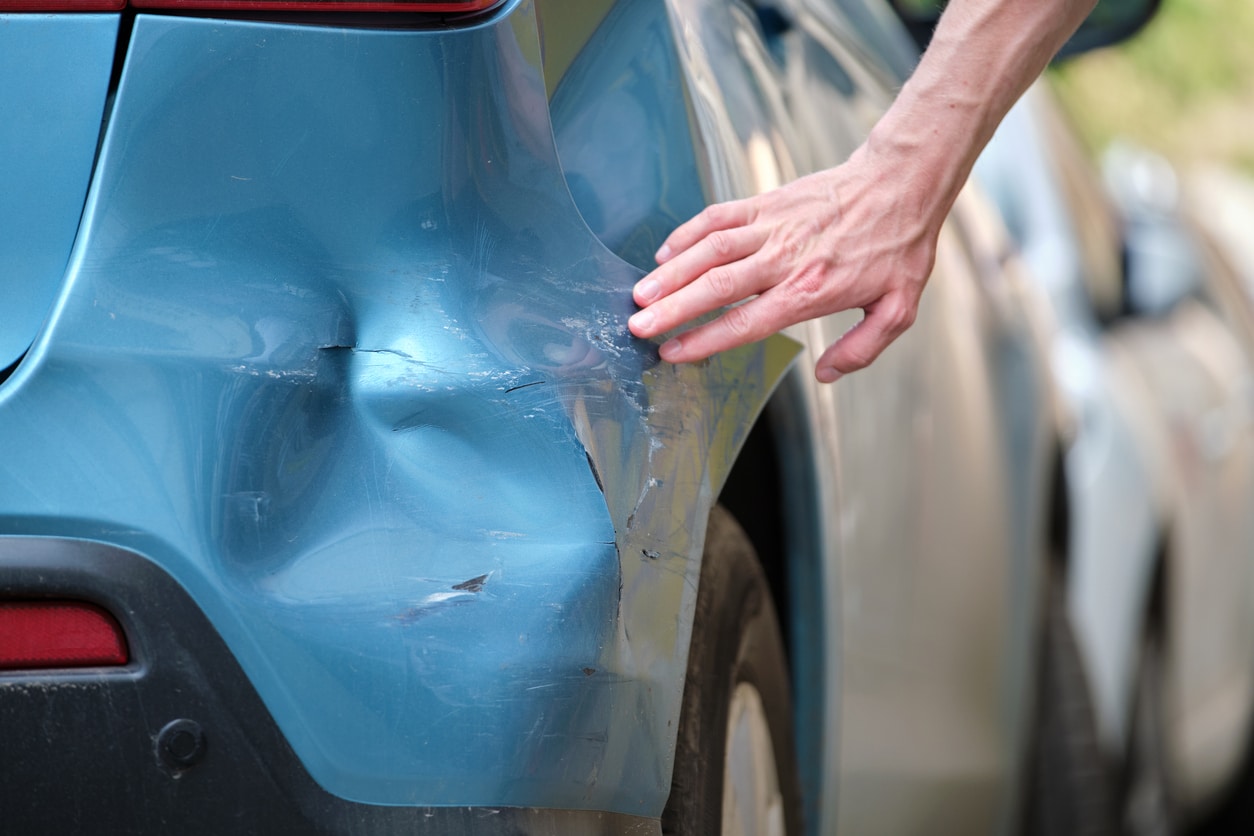Whether your car is shiny and new, or you’ve had it for years, it can be upsetting to find that your vehicle has been damaged in any way. But how much of a problem is vehicle damage for British motorists, and what do they tend to do about any dents, scratches or other issues? We set out to find out more with our survey covering everything from the most common types of car damage British motorists face to the length of time it takes them to schedule repairs. Here, you can see the responses from our survey and gain some insights into the prevalence of car damage across Britain.
Are British motorists prone to car damage?
First and foremost, we wanted to know how many Brits had ever found damage on their car. Whether it be dents, scratches or missing wing mirrors, we wanted to bring to light how much of an issue this is across the British Isles.

When asked whether their car’s bodywork had ever been damaged, 4 in 5 British motorists said that they had experienced this at some point. This could be due to accidents with other drivers, accidents between drivers and a stationary object or vandalism and intentional damage. Regardless, this is very telling about the fact that most car owners can expect some damage to their vehicle in their lifetime, no matter how severe it may be. This leaves just 20% of drivers who are the lucky few able to report that they’ve never had their cars damaged.

When further analysing those who have experienced car damage in their lifetime, 81% said their car had been subjected to paint scratches or scuffs, making this the most common type of damage. This was followed by 61% of Brits who said their car had been dented. Thankfully, scratches and dents are often minor issues and cost less to fix, especially if they only cover a small area of the bodywork. Other popular answers included cracked windshields (27%), bumper damage (26%) and rust (25%).
Interestingly, tree sap and bird-dropping damage both made the top 10, albeit lower down in the ranking with bird-dropping damage at 19% and tree sap at 8%. So even if you think your car is safe from other drivers and your own errors, it’s still worth thinking about the impact that nature can have! This list just proves how many types of damage can be prevented by simply parking in a safe place away from trees, other cars and out of direct sunlight. However, these situations are understandably difficult to avoid for many motorists.

According to our research, more than 2 in 5 UK drivers are currently driving around with some kind of damage to their car’s bodywork, whether that be scratches, dents or peeling paint. However, the majority of drivers (59%) don’t have damage to their car.
Unfortunately, over a quarter of participants said that they’d experienced vandalism or intentional damage to their car. According to data analysed by Churchill Motor Insurance, police forces received 76,889 reports of criminal damage to vehicles in England and Wales between April and September 2023, which is equivalent to 2,957 each week.
Just under a quarter of Brits also admitted they’d either written off their car themselves or their car had been written off by another driver. The majority (77%) hadn’t experienced this, though, which is good news since write-offs can be costly!

Since we now know that Brits are fairly prone to car damage, it’s interesting to see how often we check our cars for any signs of damage.
Knowing how common these situations are, it might be surprising to learn that less than a quarter of Brits check regularly. Meanwhile, the majority (45%) said that they only check sometimes.
More than 1 in 5 will rarely inspect their car for damage, which means it might go unnoticed for a while for this group of drivers. The same goes for the 7% who said they never check for damage.
Just 2% said they constantly keep an eye out for damage to their cars. Checking more often can help you spot more minor problems before they grow into bigger defects and damage.
Getting car body damage fixed
When you notice damage to your car, how likely are you to get it fixed straight away? Many different factors can affect how quickly you schedule your vehicle for repairs, including cost and time. So, how do Brits tend to handle their repairs? Let’s find out…

It seems that over half of our participants tend to get any damage fixed swiftly, with 35% having car damage fixed within one month and 16% doing so within just a week of the incident occurring.
Another 16% said they’d have their car sorted within three months, while more than 1 in 10 wouldn’t bother getting their car fixed if they experienced damage.
6% admitted it could take them up to one year, and another 6% said it could take more than a year for them to get around to fixing the damage. This might be because they’ve had a bad experience with repairs in the past, don’t have the spare cash needed or simply because they aren’t bothered by the damage.

More than 1 in 10 participants states that they have had a bad experience while getting their car’s body or paintwork repaired. This might put some motorists off from scheduling further repairs, even if they’re needed. The good news is that a whopping 89% have never had a bad experience with auto bodywork professionals.
DIY-ing it – How do Brits fare?
For those who don’t want to take it to the professionals, how do they get on with DIYing their repairs?

Almost 2 in 5 have tried their hand at DIYing a repair job on their car’s bodywork, whether that be using a paintwork pen, painting a section of the car or fixing a dent. However, the vast majority (63%) have never attempted to do so. Of those that have attempted it, just 1 in 10 said the results were ‘good’, with over a quarter (27%) stating that their DIY led to ‘poor’ results. The majority (61%) said that their car DIY results were ‘OK’.
Finally, when asked about confidence levels in performing DIY paint and body repairs on cars, almost 3 in 5 (58%) said that they wouldn’t feel confident at all, which is a strong argument for leaving the repairs to the professionals.
What measures do Brits take to avoid car body damage?
Avoiding car body damage can not only keep your car looking as good as new, but it can also save you money on repairs. So, we wanted to find out how likely British motorists are to take matters into their own hands to try and avoid car body damage.


Over half (58%) of our survey participants stated that they take measures to prevent damage to their car’s bodywork. Of these, we found that the most popular preventative measure for protecting a car is to simply drive carefully, with 61% stating that this is what they do. We also found that 57% park their car on a driveway to avoid damage, while 37% won’t park their car under trees and 31% regularly clean their vehicle to keep it damage-free.
We found that cameras are a big thing for preventing car damage, with 1 in 5 using a dash cam for car body protection. 1 in 5 also use a ring doorbell or CCTV to keep their care safe. Just 16% said they prevent damage by getting minor issues repaired quickly, which is always a good idea for making sure that minor issues don’t become bigger problems.
UK regions & car body damage: Some stats
Let’s compare the stats in different regions, starting with the areas that are more prone to car damage…

The West Midlands was the number one region for car damage, with a massive 90% of survey participants from here stating that they’ve experienced car damage at some point. This was closely followed by Wales at 85%, and the South East and Midlands which each had 84% of participants stating their cars had been damaged.
London was the least prone region for car damage, with just 64% of participants from London stating they’d experienced this, and 36% saying they’d never experienced car damage. This may be due to London having a younger median population than other areas, meaning that many have probably been driving for less time than in other regions.

The region with the most amount of participants who have experienced car vandalism was the North West with 34% stating their car had been subject to intentional damage or vandalism. This was closely followed by the North east and South West, each with 32%. Yorkshire & The Humber was the region that came out with the lowest intentional car damage which could be a sign that this is a safer region to keep your car in!
When looking at the regional differences, we also spotted some interesting stats around write-offs. A third of Northern Irish motorists said that they’d had a car written off, followed closely by 31% in the East Midlands. On the other end of the scale, just 7% of Scottish drivers said they’d had a car written off.
Additionally, we found that 57% of drivers in the West Midlands are driving a vehicle with damage, followed by 49% in Wales. North East drivers seem to be the keenest on getting their car fixed promptly since just 24% are currently driving around with a damaged vehicle.
That concludes our results on Brits and car damage. Here at JTAPE, we highly condone leaving any bodywork or automotive paint repairs to the professionals. For more insights on the automotive industry, head over to our blog.
